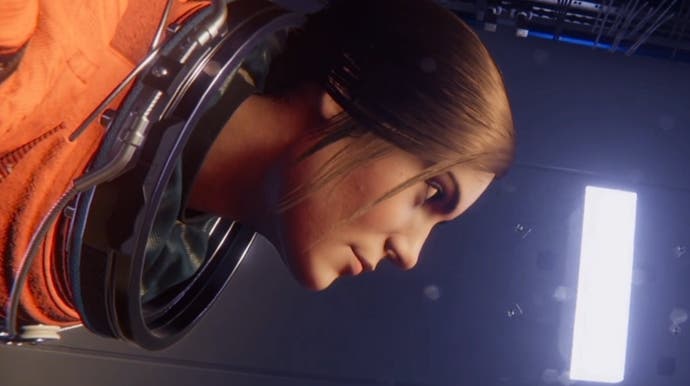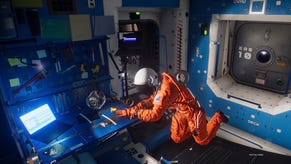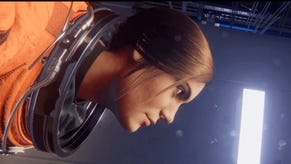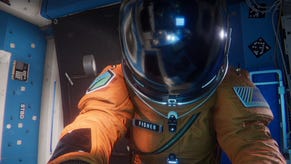Observation review - a simple puzzler elevated by its sublime atmosphere
HAL freezes over.
Developer No Code has tirelessly described Observation as "2001 but from the perspective of HAL", a proposition that is as intriguing as it is unique, especially coming from a studio that features several people who used to work on Creative Assembly's Alien: Isolation.
Observation begins after an unexplained incident on the LOSS - short for Low Orbit Space Station - which sits in orbit around Earth. You hear a crew member frantically try to make contact with mission control, but around you everything is dark until the runaway space station spins past a light source, revealing nothing but a floating helmet and other wayward equipment.
It immediately instills a sense of unease, a feeling that doesn't lift throughout the entire experience. Soon after this your role becomes clear. You're Sam (voiced brilliantly coldly by Anthony Howell), the station's System, Administration and Maintenance, alone with the crew doctor Emma Fisher (Kezia Burrows, a familiar voice given the setting after her role as Amanda Ripley in Alien Isolation). Emma has just gotten her bearings when a mysterious outside force tampers with your system and gives you one command: Bring Her. This leads Sam to make his first independent decision - he unceremoniously moves the whole station to Saturn.
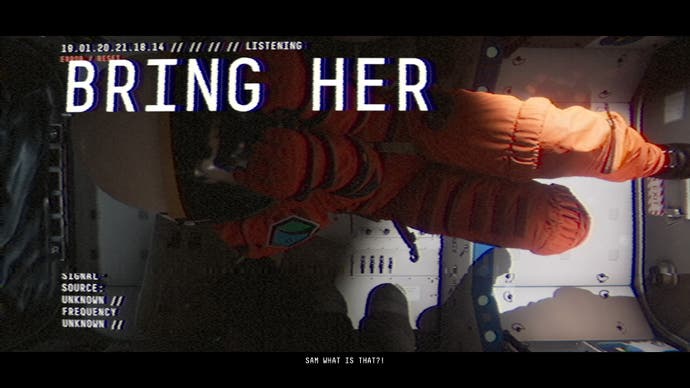
What a way to start. It all works so well because it uses the shared cultural language we've built around the sources Observation is inspired by. Whether it's trundling through open space in Gravity or the sole human interacting with the unknowable machine in 2001, No Code pays homage to sci-fi's greatest moments, without ever outright copying them.
I immediately, almost feverishly wanted to know what would happen next. Unfortunately for me, i still had my job as an AI to keep a handle on too. Emma has a damaged, seemingly deserted space station to take stock of, and I'm her eyes, ears and hands throughout the process. Sam's memory core was wiped during the accident, and so as I'm restoring the LOSS to functionality, I'm also restoring functionality to him, or rather, myself. Tasks are simple - Emma asks me to open a door, scan a portion of the ship or turn on a program in the same way I ask Alexa what Benedict Cumberbatch's net worth is. Ask, wait a moment and you shall receive.
As Sam however, I have to determine how to give Emma what she wants first. That can start with trying to work out what exactly she wants me to do. Some commands likely make sense to an AI familiar with all of its functions, but to a machine with a half broken memory core they can be very vague. Once I know what to do I get to work. To unlock a door for example, I draw a schematic, later I turn on a generator by rerouting the strength of its magnets. All of these tasks are less puzzle and more making sense of a UI no one gave you a manual to. If I'm working with Sam's internal system, a press of a button on an interface often does the trick, giving a satisfying kinetic and visual representation of my inner workings. If I'm using a system designed for the crew things may be slightly more complex. But there's no game over state and no acknowledgement of my failings apart from Emma becoming a bit annoyed with me.
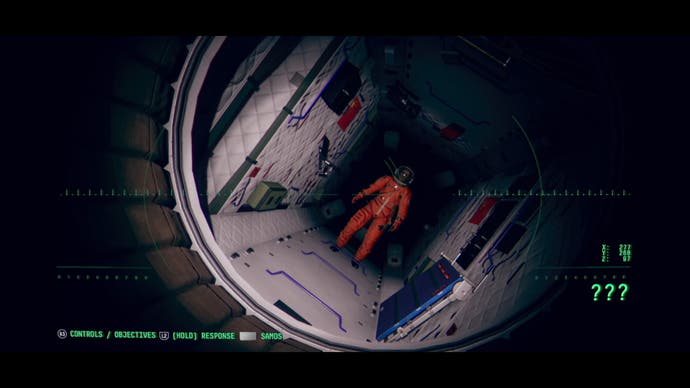
The lone astronaut repairing equipment in order to survive has been done plenty of times before, of course, and at times that detracts from Observation's strong narrative. I always tinker away in complete silence, and while I work, Emma seems to be doing nothing. She doesn't wonder out loud what happened, and she doesn't acknowledge any changes throughout, neither to Sam nor to her own situation. The story moves forward at specific points, usually whenever I have finished a larger task, but being an AI can get rather lonely in the meantime. It feels as if everything is waiting for me.
You put together what happened in the exploration portions of the game that, like No Code's previous game Stories Untold, play more like a hidden objects game because there really isn't that much to explore. You can collect audio logs from laptops around the station as well as different documents, files and the aforementioned schematics to restore Sam's memory. Observation's own fidelity to the design of a modern space station can make searching for things a tedious affair. The game's set in 2026, and so the station is closely modelled after what the inside of the ISS looks like, with equipment that's both high and low tech. This means stark white modules filled with different machinery and an array of laptops, belongings strapped to the walls and no real sense of top or bottom. Each module has its own design, and the detail and care that's gone into it all is amazing, though that appreciation lessens when you slowly move a camera up and down while looking for a single sheet of paper or you bump into something yet again while fighting with the sphere's movement controls.
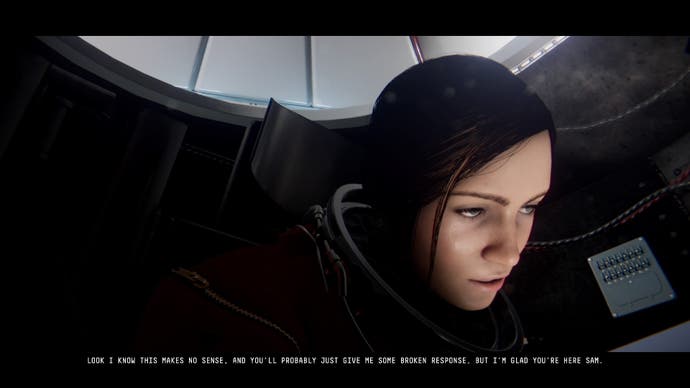
Observation is not so much about exploration as it is about navigation; more than once your only task is to get from A to B, precisely because that can be hard enough as it is in a space in which everything tends to blur together after a while. Yet I cannot stress enough how these negative aspects become all but background noise compared to the expertly crafted atmosphere. There's a very real dread when roaming around a quiet space station, backed up in Observation by sparse music and white noise suggesting the vastness of space and the depth of my loneliness. Excellent sound design makes the LOSS come alive, from the soft sound of my own hydraulics to each UI's individual noises - and if you love UI design, you will love Observation. No Code's studio director and Observation's lead designer Jon McKellan created the beautiful interfaces for Alien: Isolation, and he's done a great job on them for his own game, too. Sam's video feed crackles and distorts like an old VHS cassette, and lights flicker on every machine.
Observation doesn't explain itself to you, and it keeps its cards close to its chest even after you go through the effort of digging up as many bits of background info as possible. The greatest compliment I can give is how I longed for all the parts it withheld from me - more interactions between Emma and Sam, a more coherent thread between all the mysterious happenings so they feel less like a sci-fi cliche checklist. I levy the same criticism towards it I do to my favourite sci-fi films - a myriad of influences, theories and plot points come together until it feels almost too much and you're not sure what to focus on. But this is part of what makes it stay with you, what makes you turn over what you've just experienced long after the credits have rolled.
Observation works almost in spite of itself. Its individual parts aren't particularly interesting, but the slow dread, the pull of uncovering the next bit of the puzzle, makes you bear with its less confident parts. Perhaps its premise of an AI suddenly attaining consciousness is ultimately underused, but this remains an intriguing, atmospheric spin on a rare theme in games.
